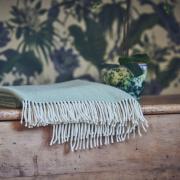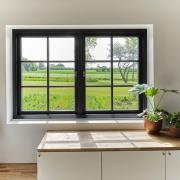This month the clocks go back so make that extra hour count with a bed made of bliss

Poor sleep is a bit like wearing uncomfortable shoes – no matter what else happens in the day, it’s impossible to fully enjoy it. And the chances are since you last bought a bed, a huge technological revolution in the science of sleep has happened. So there are many, many things to consider when buying a bed. For this we need the experts. “Your physical comfort is fundamental. We can’t do anything about emotional disturbance or stress, but if the environment is right at least your body is rested,” says Roger Charles from British Beds Worldwide Ltd (britishbedsworldwide.com).
Go large
Ideally your mattress should be 10cm longer in length than the tallest person who sleeps on it; so if you’re 6ft or taller, you should opt for a king size or bigger.
Avoiding aches and pains
Keeping your spine aligned whilst sleeping is key to a comfortable night’s sleep. If you’re of a lighter build, a soft mattress could be suitable for you, as you will need a little more give for the mattress to adjust to the contours of your body. Conversely, if you’re of a bigger build a firmer mattress should be just the job to keep you supported, explains Grace Ryder from Devon’s Natural Mat (naturalmat.co.uk).

Sharing a bed
If you and your partner prefer different tensions, there are a few nifty solutions - you can both get the support you want by splitting the mattress in two, with different comfort levels for each half and then zipping them together. Some handmade bed companies such as Roger Charles (rogercharles.com) will even offer different firmness levels in the same mattress.
Your partner could be the reason you are getting interrupted sleep so Roger Charles advises you to get the biggest bed you can fit into your bedroom - even if it means ditching the bedside table. Getting a decent pocket sprung mattress will also reduce how much you can feel your partner’s fidgeting - and promote marital harmony.
Sleeping Positions
Your sleeping position changes throughout the night but if you tend to sleep in one position more than others, here are a few things worth considering. Softer mattresses are often better for those who sleep on their sides, allowing your hips and shoulders to sink into the mattress and keep your spine nicely aligned. Firmer mattresses can be a good choice if you sleep on your front or back, as the mattress doesn’t need to allow for the additional contours of your shoulders and hips. If you never stay in the same position for more than five minutes and you’re of average height and build then a medium mattress is probably just the mattress for you.

All mattresses are not equal
Of course it’s not just what’s on the inside that counts. Most of us are looking for a soft, comfortable, natural exterior on our mattress – what’s the point in that 1,000-count Egyptian cotton and organic lavender oils if the mattress beneath is wrapped in chemicals to make if fire retardant? Happily Devon is home to some incredible bedmakers. Cottonsafe (cottonsafenaturalmattress.co.uk) has created a revolutionary, completely natural material which passes all the UK furniture fire regulations. Cottonsafe material blends organic cotton and natural wool in a unique way, making it possible for the first time to make mattresses and sofas without any chemical fire retardants. And its green credentials do not end there. The natural cotton and wool fibres are completely biodegradable and do not have any of the disposal problems associated with chemical fire retardants. British Beds Worldwide Ltd offers a private shopping experience at their Yelverton showroom. Pre-book and you can have the beds to yourself for three hours. “We tell people to buy the one they fall asleep on,” says founder Roger Charles.
Some like it too hot
It’s true that the body temperature drops when we sleep – hence the duvet. The perfect temperature is between 15.5 and 19.5 degrees Celsius (60 and 67 degrees Fahrenheit) for optimal sleep (sleep.org). It will vary depending on the individual and especially whether you are a snuggler who likes plenty of blankets and duvets. Roger at British Beds Worldwide advises wool is the best material for anyone inclined to overheating in bed. It’s designed to draw away moisture. He also advises against foams which respond to warmth and are designed to hold it.




























